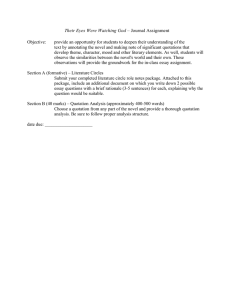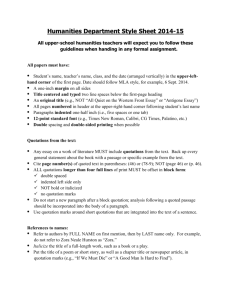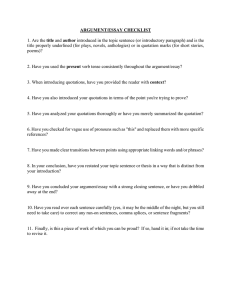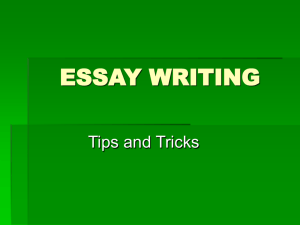Title, format, quotation. How to title your paper:
advertisement
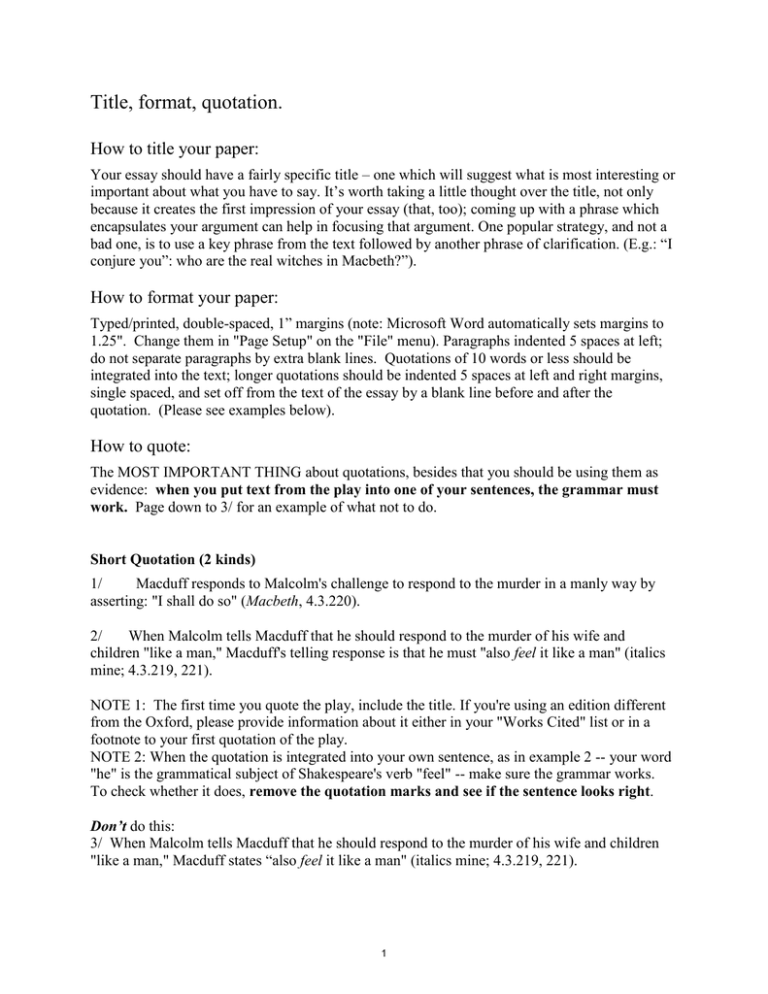
Title, format, quotation. How to title your paper: Your essay should have a fairly specific title – one which will suggest what is most interesting or important about what you have to say. It’s worth taking a little thought over the title, not only because it creates the first impression of your essay (that, too); coming up with a phrase which encapsulates your argument can help in focusing that argument. One popular strategy, and not a bad one, is to use a key phrase from the text followed by another phrase of clarification. (E.g.: “I conjure you”: who are the real witches in Macbeth?”). How to format your paper: Typed/printed, double-spaced, 1” margins (note: Microsoft Word automatically sets margins to 1.25". Change them in "Page Setup" on the "File" menu). Paragraphs indented 5 spaces at left; do not separate paragraphs by extra blank lines. Quotations of 10 words or less should be integrated into the text; longer quotations should be indented 5 spaces at left and right margins, single spaced, and set off from the text of the essay by a blank line before and after the quotation. (Please see examples below). How to quote: The MOST IMPORTANT THING about quotations, besides that you should be using them as evidence: when you put text from the play into one of your sentences, the grammar must work. Page down to 3/ for an example of what not to do. Short Quotation (2 kinds) 1/ Macduff responds to Malcolm's challenge to respond to the murder in a manly way by asserting: "I shall do so" (Macbeth, 4.3.220). 2/ When Malcolm tells Macduff that he should respond to the murder of his wife and children "like a man," Macduff's telling response is that he must "also feel it like a man" (italics mine; 4.3.219, 221). NOTE 1: The first time you quote the play, include the title. If you're using an edition different from the Oxford, please provide information about it either in your "Works Cited" list or in a footnote to your first quotation of the play. NOTE 2: When the quotation is integrated into your own sentence, as in example 2 -- your word "he" is the grammatical subject of Shakespeare's verb "feel" -- make sure the grammar works. To check whether it does, remove the quotation marks and see if the sentence looks right. Don’t do this: 3/ When Malcolm tells Macduff that he should respond to the murder of his wife and children "like a man," Macduff states “also feel it like a man" (italics mine; 4.3.219, 221). 1 NOTE 3: Two things are wrong here. The grammar does not work, because “feel” needs a subject; and Macduff is unlikely to be uttering this line in the dispassionate tone suggested by “states”. Long Quotation Here I am, writing along in my essay, along and along and along. Here comes a long quotation (longer than 10 words) from Steven Greenblatt's article on Shakespeare and witchcraft; Greenblatt argues that [t]he demonic in Shakespeare's early history play [I Henry VI] makes history happen... the witches in Macbeth by contrast account for nothing" ("Shakespeare Bewitched," 122). (Notice that I’ve used brackets for anything that alters Greenblatt's sentence, and used an ellipsis to skip over some details that I didn't need). Okay, quotation’s over; if I'm using the "Works Cited" format, I'm done, and if I'm using footnotes, I would footnote full information for the source the first time and cite it parenthetically after that – as in the example above. Back to the essay now, with double-spacing and regular margins again. If I decided to include a longer quotation from the play, it would look like this: Macduff. I cannot but remember such things were That were most precious to me; did Heaven look on, And would not take their part? (4.3.222-24). One other thing: anytime you include a long chunk of text, be sure to talk about its details and what, specifically, we should understand from reading it. If there is not enough to say, the quotation should probably be shorter. 2 MIT OpenCourseWare http://ocw.mit.edu 21M.013J / 21A.113J / 21L.013J The Supernatural in Music, Literature and Culture Fall 2013 For information about citing these materials or our Terms of Use, visit: http://ocw.mit.edu/terms.
